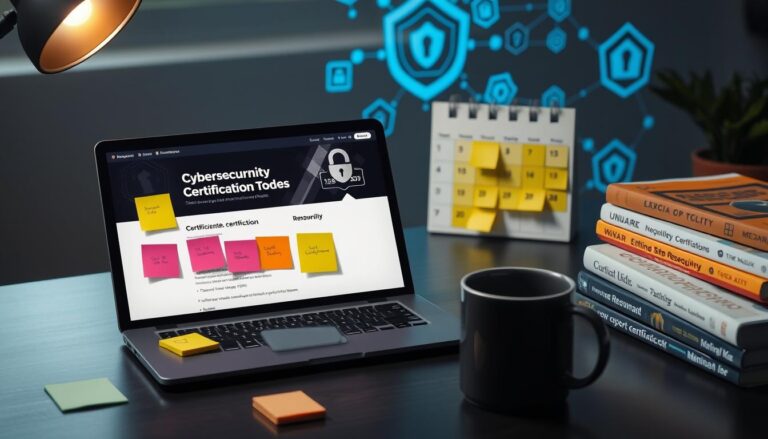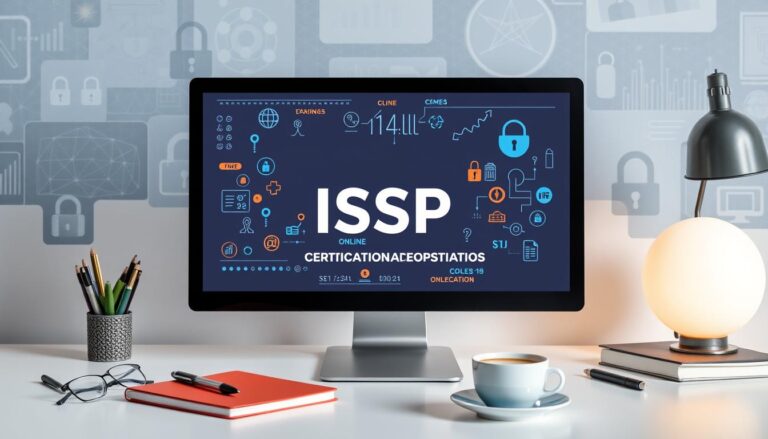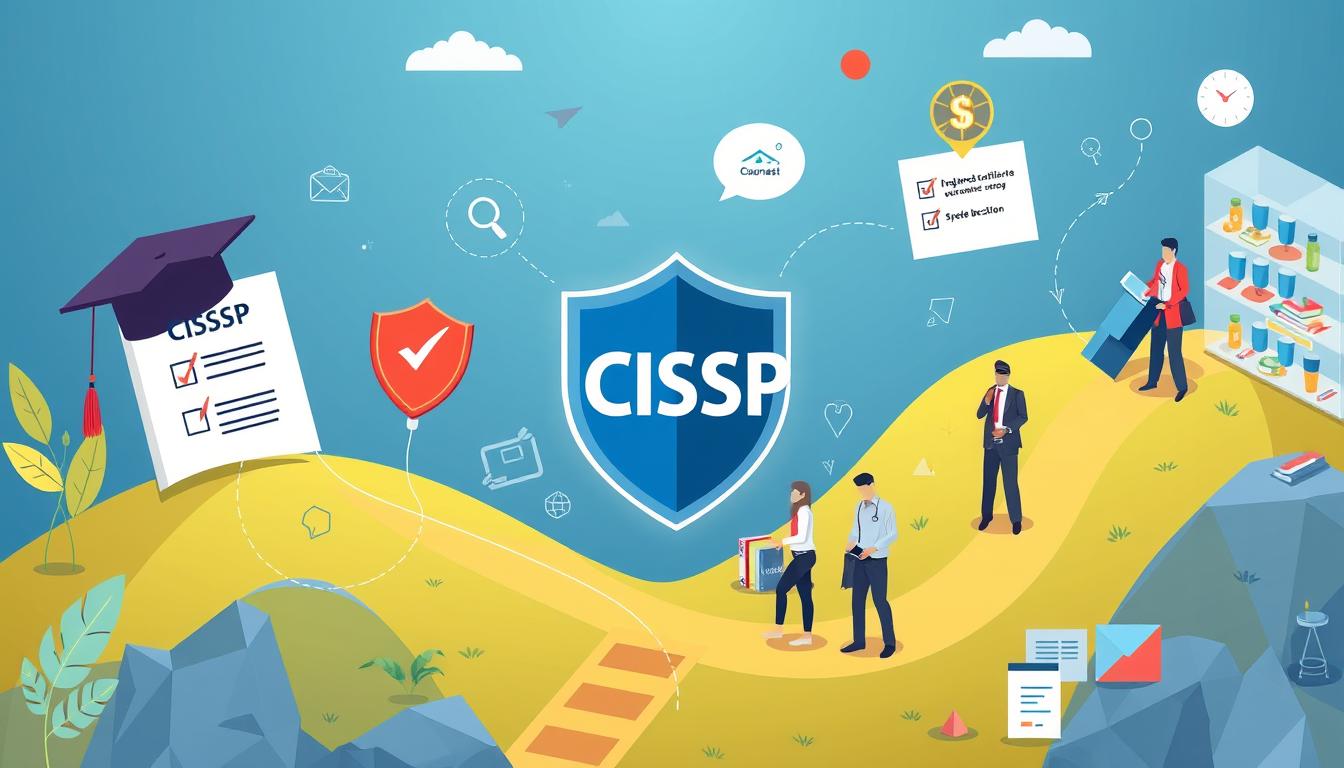
Did you know nearly 25% of cybersecurity jobs in 2020 needed CISSP certification? This shows how much employers value certified professionals in information security. Getting CISSP can really help your career and even increase your salary by 25% globally.
This guide will cover what you need to get CISSP certified. You’ll learn about education, work experience, and the whole certification process. Knowing how to get CISSP certified will help you succeed in cybersecurity.
Introduction to CISSP Certification
The CISSP certification is a key achievement in cybersecurity. It’s recognized worldwide and is the “gold standard” in cybersecurity certifications. It shows you’re an expert in information security, which is vital as threats grow more complex.
To get the CISSP, you need at least five years of work in cybersecurity. This shows you have deep knowledge in the field. The exam covers eight main areas, like managing risks and securing software, to make sure you know everything important.
The CISSP is also valued by the U.S. Department of Defense and meets ISO/IEC standards. It helps both individuals and companies meet high security standards. Many CISSP holders become top leaders, like CISOs or IT Directors, showing its importance for career growth.
Over one million people worldwide have earned this certification. To keep it, you must get 120 CPE credits every three years. This keeps your skills up to date in the fast-changing world of cybersecurity.
What is the CISSP Certification?
The CISSP definition is a well-known credential for cybersecurity experts. It shows you know a lot about keeping information safe. This includes managing risks, protecting assets, and designing security systems. It’s a key step for those wanting to grow in the cybersecurity field.
Having the CISSP certification is very important. It proves you’re good at creating and managing security plans. It also makes you more credible in your job. Getting this certification can lead to more job opportunities and make you more appealing to employers.
| Key Features of CISSP Certification | Details |
|---|---|
| Experience Requirement | Minimum of five years of cumulative paid work experience in two or more of the eight domains of the CISSP Common Body of Knowledge (CBK). |
| Education Waiver | One year of experience can be waived with relevant education or approved ISC2 certifications, reducing the requirement to four years. |
| Exam Format | The CISSP exam consists of 100 to 150 questions, with a passing score of at least 70%. |
| Validity Period | CISSP certification is valid for three years, requiring 120 Continuing Professional Education (CPE) credits to maintain. |
| Annual Maintenance Fee | USD $135 for CISSP certification holders. |
| Salary Potencial | Average salary for professionals with CISSP certification is around $116,500, with the chance for more. |
In summary, the CISSP certification is key for a strong career in cybersecurity. Knowing what the CISSP is and what it takes to get it is the first step to achieving it.
CISSP Certification Requirements Overview
To get CISSP certification, you need to meet several key points in the CISSP certification requirements overview. You must have at least five years of work experience in at least two of the eight CISSP domains. This experience can be gained in different ways, like getting a degree or an approved credential from ISC2.
It’s also important to know about part-time work and internships. Part-time work counts if you work at least 20 hours a week. Internships, whether paid or not, are also valid and need proof from the organization.
The exam is a big part of getting CISSP certified. You’ll face 100 to 150 questions in a special testing format. You need to score 700 out of 1000 to pass. The exam lasts three hours, giving you enough time to show your skills.
After passing the exam, you must go through the endorsement process. You have to do this within a certain time to keep your certification. If you pass the exam but don’t have enough experience, you can become an Associate of ISC2. This status gives you six years to gain the needed experience.
The new CISSP certification rules start on April 15, 2024. Knowing these rules helps you plan your certification journey better.
| Requirement | Description |
|---|---|
| Experience | Five years of full-time experience in at least two of the CISSP domains. |
| Education Waiver | A relevant degree can waive up to one year of experience. |
| Additional Credentials | An ISC2-approved credential can also waive up to one year of experience. |
| Exam Format | 100-150 questions using Computerized Adaptive Testing. |
| Passing Score | 700 out of 1000 points required. |
| Endorsement | Must be completed within a timely manner after passing the exam. |
CISSP Eligibility Criteria
To become a CISSP, you need to meet certain requirements. You must have at least five years of direct security work experience. This experience should be in two or more of the eight Common Body of Knowledge (CBK) domains.
If you have a college degree in information security, you might get a break. You could need only four years of experience instead of five. This is if you have a four-year college degree or an advanced degree in information security.
You can also meet the experience requirement with certain certifications. For example, the Certified Information Systems Auditor (CISA) and Certified Ethical Hacker (CEH) are recognized. There are 60 such certifications on the (ISC)² approved list. These cover areas like cloud security and forensic analysis.
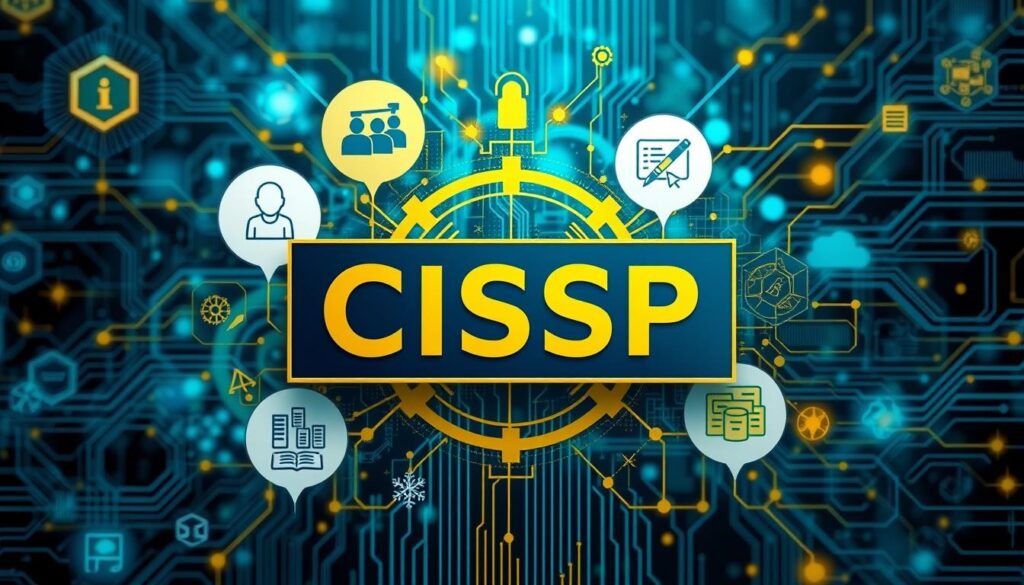
Getting a degree from a U.S. National Center of Academic Excellence can also help. It can reduce your required experience to four years. The CISSP eligibility criteria are set up to make it easier for new professionals to join the field.
CISSP Experience Requirements
To get the CISSP certification, you need to show you know a lot about information security. You must have real-world experience in this field.
Direct Full-Time Security Professional Work Experience
You need at least five years of work in information security to get the CISSP. This work must cover two or more of the eight domains in the Common Body of Knowledge (CBK). If you have part-time work, it must be 20 to 34 hours a week.
For part-time work, 1,040 hours are equal to six months of full-time work. Make sure your application shows you’ve worked in these domains. This is key to getting your certification.
Experience Waivers Through Education
You might not need all five years of experience. If you have a four-year degree or a specialized advanced degree, you can get a one-year waiver. Also, some security certifications can help you waive a year of experience.
Many security certifications are approved, like the CCSP and CompTIA Security+. A four-year degree can help, but it only covers one year. You need four more years of experience to get certified.
If you pass the CISSP exam without enough experience, you have six years to get the rest. This gives you time to gain the experience you need while working in cybersecurity.
| Experience Requirement | Details |
|---|---|
| Minimum Full-Time Experience | 5 years across 2 or more CBK domains |
| Part-Time Experience | At least 20 hours/week, max 34 hours/week |
| Experience Waiver – Degree | 1 year waived for a 4-year or higher degree |
| Experience Waiver – Certification | 1 year waived for approved security certifications |
| Experience Validation | Must show engagement in at least 2 CBK domains |
CISSP Exam Prerequisites
To start your journey to CISSP certification, you must meet certain requirements. You need at least five years of paid work experience in two of the eight CISSP domains. Or, if you have a four-year college degree, you need four years of professional security experience in two domains.
Those with (ISC)² credentials can get a one-year experience waiver. This waiver applies if you’ve had full-time roles with at least 40 hours of relevant tasks per week.
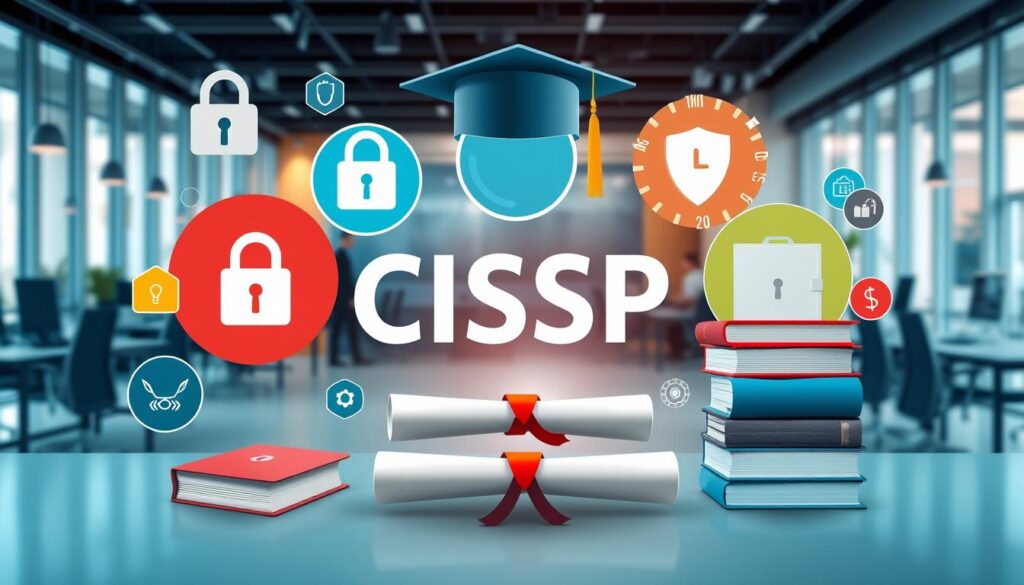
The CISSP exam covers many important topics in cybersecurity. These include security architecture and risk management. You’ll also need to answer questions about your background, like any felony convictions or criminal hacking history.
| Experience Type | Hours Required | Experience Conversion |
|---|---|---|
| Full-Time Work | At least 35 hours per week for four consecutive weeks | 1 month of experience |
| Part-Time Work | At least 20 hours per week | 1040 hours = 6 months; 2080 hours = 1 year |
| Internships | Documented hours in relevant tasks | Counts toward total experience requirement |
To keep your CISSP certification, you must pass the exam and earn 120 CPE credits in three years. These steps make the CISSP a respected credential in information security.
How to Prepare for the CISSP Examination
Getting ready for the CISSP exam needs a good plan and the right resources. Knowing how to prepare can really help you pass. Use CISSP study resources to learn more and study better.
Study Resources and Training Options
There are many ways to get ready for the CISSP exam. Official guides, online courses, and practice exams are great starting points. Here are some top resources to consider:
- Official (ISC)² CISSP Study Guide: This guide has 21 chapters and over 1,115 pages.
- Practice Tests: Try CISSP practice tests to check your knowledge.
- Webinars and Online Courses: Find flexible training that fits your schedule.
- Group Discussions: Learning with others can help you remember more.
ChatGPT is a free tool that can help with CISSP topics. It’s a great way to learn more.
Creating a Study Plan
A good CISSP study plan keeps you focused and covers all topics. Here’s how to make one:
- Assess Your Learning Style: Figure out what works best for you, like reading or watching.
- Dedicating Study Time: Study at least two hours a day. This will help you pass in about three months.
- Outline the Domains: The CISSP exam has eight domains. Organize your study by these areas.
- Practice Regularly: Take practice tests often. Aim for good scores to feel confident.
Having a study plan helps you stay on track. It makes you more likely to do well on the exam.
CISSP Certification Process
Getting your CISSP certification is a big step in your career. First, you need to check if you qualify. You must have at least five years of work experience in two of the eight CISSP domains. These domains cover key areas of information security.
If you have a four-year degree or an approved credential, you can skip one year of experience. This makes getting certified faster. Next, you need to prepare for the exam. Choose good study materials and make a plan to go through the material well.
The CISSP exam has 250 questions and takes 6 hours to finish. You need a score of 700 out of 1000 to pass. In the U.S., the exam costs between $549 and $599, depending on when you sign up. If you fail, you have to wait 30 days, then 90 days, and 180 days for each try after that.
After passing, you must get your experience verified by a CISSP. Then, your certification is good for three years. During this time, you must get 120 CPE credits, with 80 of them being Type A, which is about information security.
Here’s a quick guide to getting your CISSP certification:
| Step | Description |
|---|---|
| 1 | Verify eligibility requirements (5 years of experience or waivers) |
| 2 | Prepare for the CISSP exam using study materials |
| 3 | Schedule and pay for the exam |
| 4 | Pass the CISSP examination |
| 5 | Complete the endorsement process |
| 6 | Maintain certification by fulfilling CPE credits |
By following these steps carefully, you can smoothly go through the CISSP certification process. This will help you start a successful career in cybersecurity.
CISSP Endorsement Guidelines
After passing the CISSP exam, you need to understand the endorsement guidelines. You must find an active (ISC)² member to endorse your application. You’ll need to provide accurate details about your work experience.
To qualify, you need at least five years of full-time work in security. If you have a bachelor’s or master’s degree, you can substitute one year of experience.
You have nine months from your exam date to complete the endorsement. After applying, (ISC)² will update you within six weeks. If you haven’t heard back after eight weeks, contact (ISC)² to check on your application.
Keeping your CISSP certification active requires ongoing effort. You must earn 120 CPE credits over three years. This includes 40 credits each year. You also need to renew your certification every three years, paying an Annual Maintenance Fee of $125.
The endorsement process may include an audit of your application. This audit is random and may ask for more details about your experience. If you pass the exam but don’t meet the experience requirement, you get Associate of (ISC)² status. This status allows you six years to meet the experience requirement while continuing to grow in cybersecurity.
| Endorsement Requirement | Details |
|---|---|
| Exam Score Minimum | 700 out of 1000 points |
| Experience Requirement | 5 years of full-time work experience (1-year waiver possible with degree) |
| Endorsement Timeframe | 9 months from exam date |
| Update Review Duration | 6 weeks after application submission |
| Annual Maintenance Fee (AMF) | $125 for CISSP; $50 for Associates |
| CPE Credits Required | 120 credits over 3 years (40 credits annually) |
| Audit Process | Random selection may require detailed proof |
CISSP Continuing Education Credits
To keep your CISSP certification, you must stay committed to learning. You need to earn at least 120 Continuing Professional Education (CPE) credits every three years. Each year, you should get 40 CPE credits. This keeps your skills up to date in a fast-changing field.
CPE credits come from different activities, such as:
- Attending relevant training sessions and webinars
- Participating in cybersecurity conferences
- Volunteering for cybersecurity initiatives
- Reading security-related publications
- Publishing articles or books on security topics
One hour of eligible activities usually equals one CPE credit. There are two types of credits:
| Group Type | Description | Credit Example |
|---|---|---|
| Group A | Domain-related activities essential for professional development. | Attending a cybersecurity workshop. |
| Group B | General professional skills and knowledge sharing. | Participating in a non-security industry seminar. |
If you find it hard to meet these needs, a 90-day grace period is available. This allows you to earn and submit CPE credits after your certification expires. Joining in ISC2 activities can help you gather the needed credits easily. This ensures you meet the CISSP certification standards.
Conclusion
Getting the CISSP certification is a big step for your career in cybersecurity. It shows you understand the CISSP certification summary and its needs. You need five years of work experience in at least two of the eight CISSP CBK domains.
Knowing other ways to qualify, like a four-year degree or approved credentials, helps too. This makes it easier to meet the eligibility criteria.
The CISSP certification is more than just passing an exam. It’s about the hard work you put in before. You should study for about four to six months and answer at least 1,000 practice exam questions.
After you get certified, you must keep up with education credits. This keeps you up-to-date with the latest in the field.
Choosing to get the CISSP certification boosts your credibility and pay. In North America, you could earn up to $147,757. By following these steps, you can become a leader in information security.
Source Links
- How to Earn the CISSP Certification (Training & Requirements)
- CISSP Exam Requirements
- CISSP – Certified Information Systems Security Professional | ISC2
- CISSP Certification & Requirements – Complete Guide (2024)
- The complete CISSP certification guide
- CISSP Exam Requirements & Prerequisites: Eligibility and Work Experience
- CISSP certification: Requirements, training, exam, and cost
- What is CISSP Certification, Salary and Requirements?
- CISSP Experience Requirements
- CISSP Exam Outline
- CISSP certification cost and requirements (2024) | Essential information
- CISSP Eligibility Requirements – Get Certified
- CISSP Certification Requirements – Are you eligible for CISSP?
- What Counts As CISSP Experience?
- CISSP CERTIFICATION REQUIREMENTS
- The CISSP experience waiver [updated 2022]
- PREREQUISITE GUIDE
- Understanding CISSP Experience Requirements: A Comprehensive Guide
- Preparing for the ISC2 CISSP Exam
- How To Prepare For CISSP Exam in 2024
- Preparing for CISSP Exam
- Steps to Become CISSP (Certified Information Systems Security Professional)
- The CISSP Endorsement Process – CISSP Requirements
- 4 Steps to Earn a CISSP Certification | CISSP Process
- The CISSP Endorsement Process: How to Validate Your Cybersecurity Expertise
- CISSP certification – The ultimate guide [updated 2021]
- Managing Your ISC2 CPE Credits and Activities
- Earning CPE credits to maintain the CISSP
- CISSP CPE Hints | How to Earn ISC2 CPE Credits
- Breaking Down the CISSP Experience Requirements
- The Ultimate Guide to Earning the CISSP Certification – Qualifications, Benefits, and Salary Potential
- What is CISSP? All about CISSP concepts, CISSP Benefits
